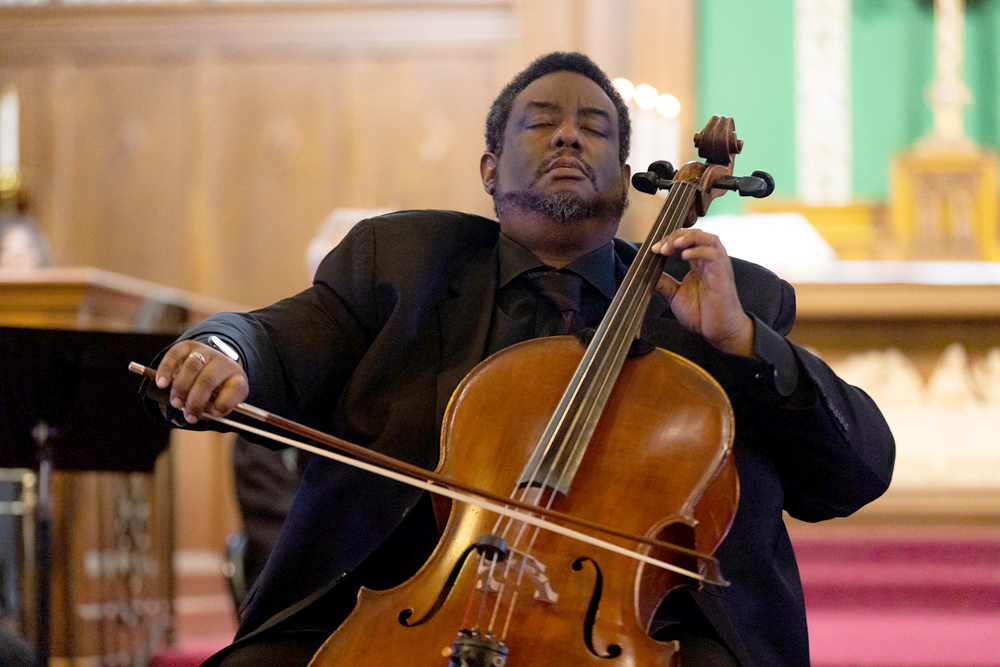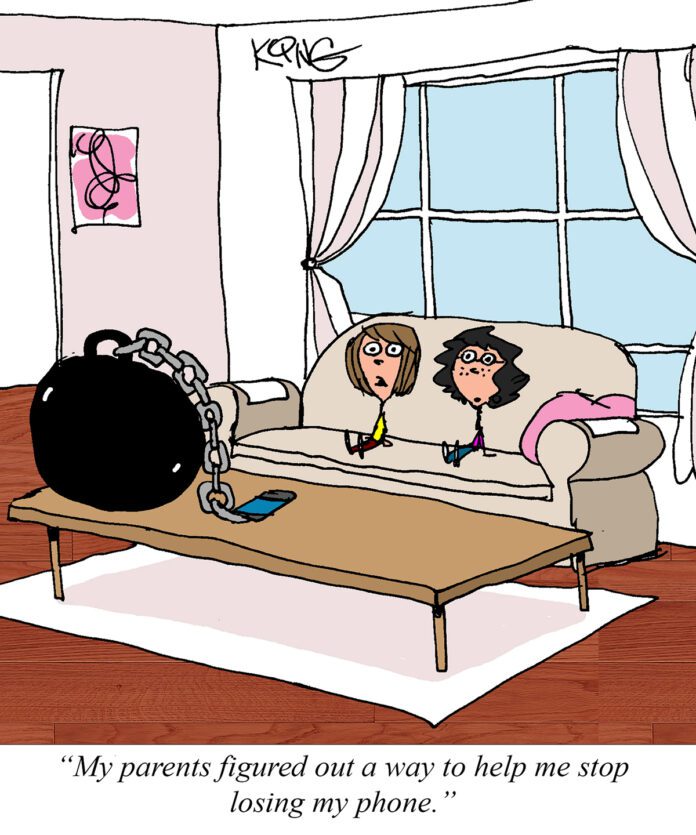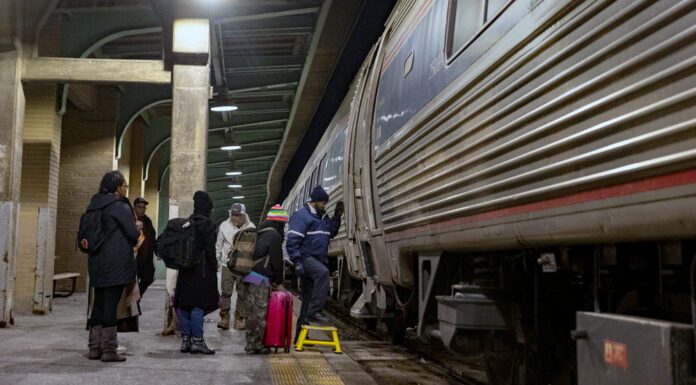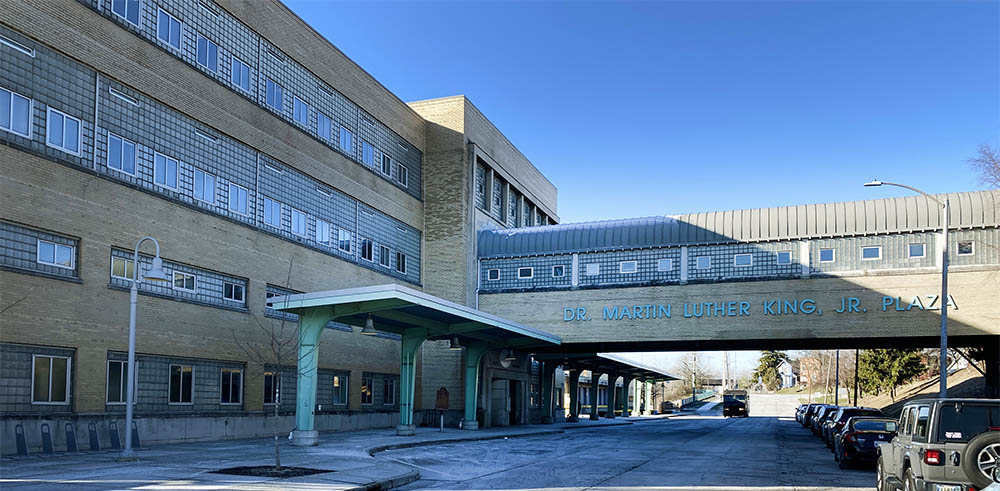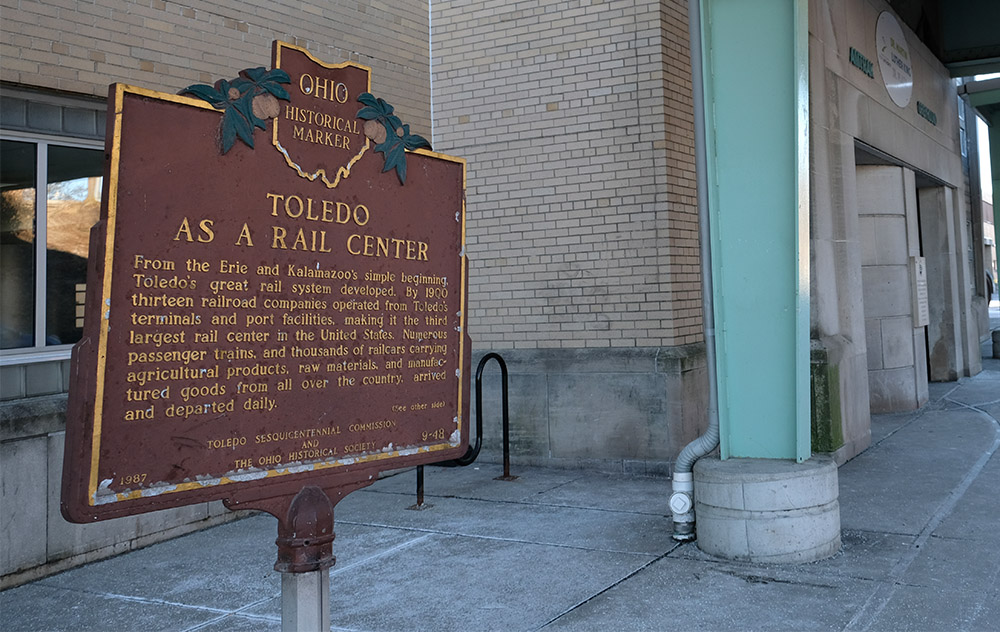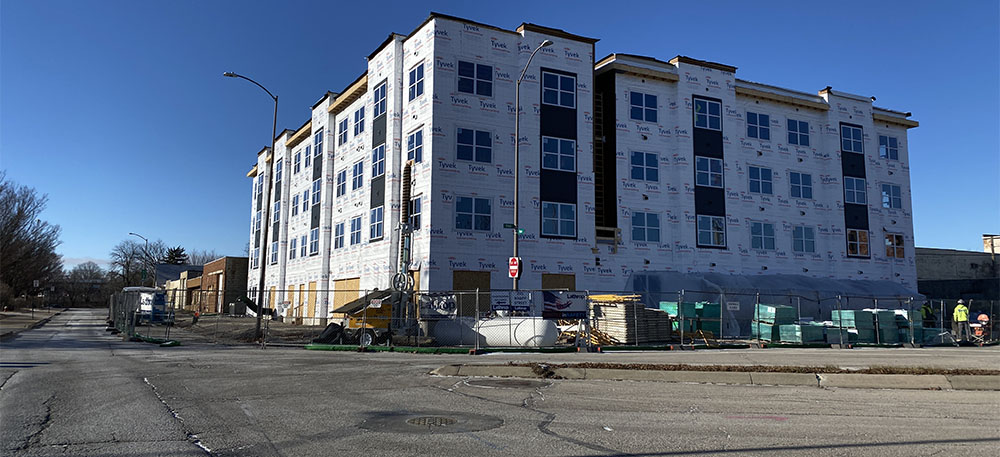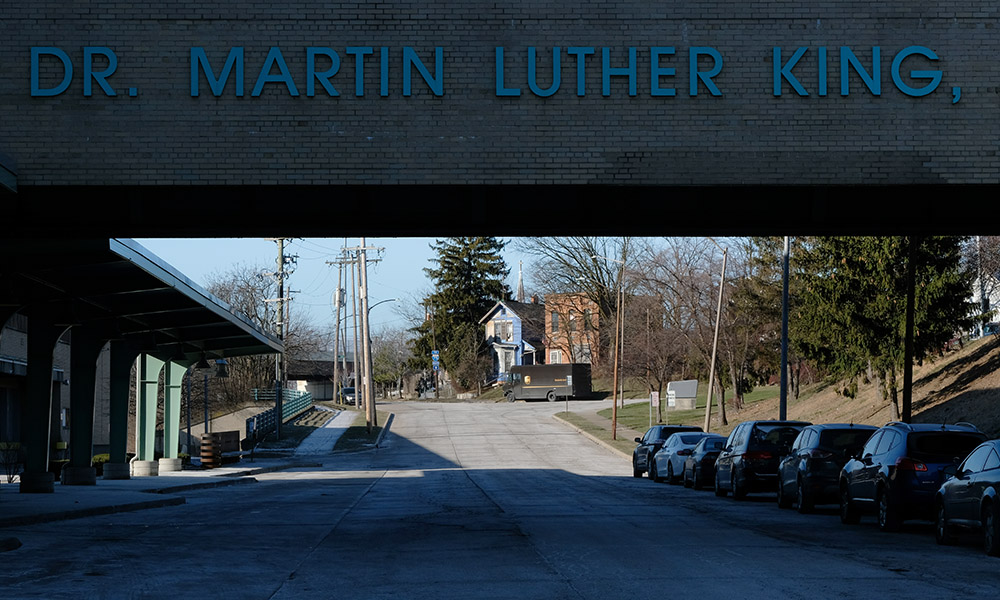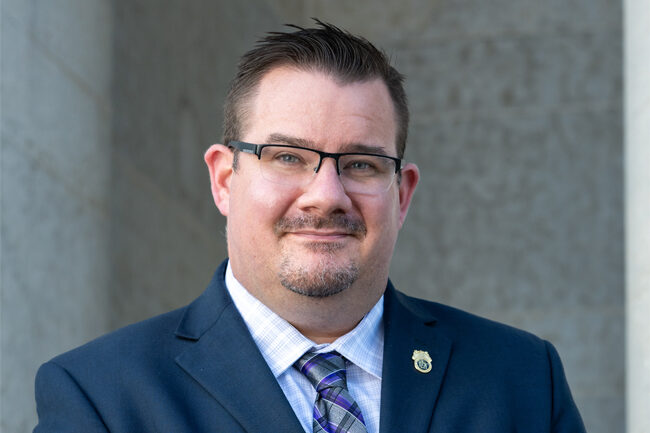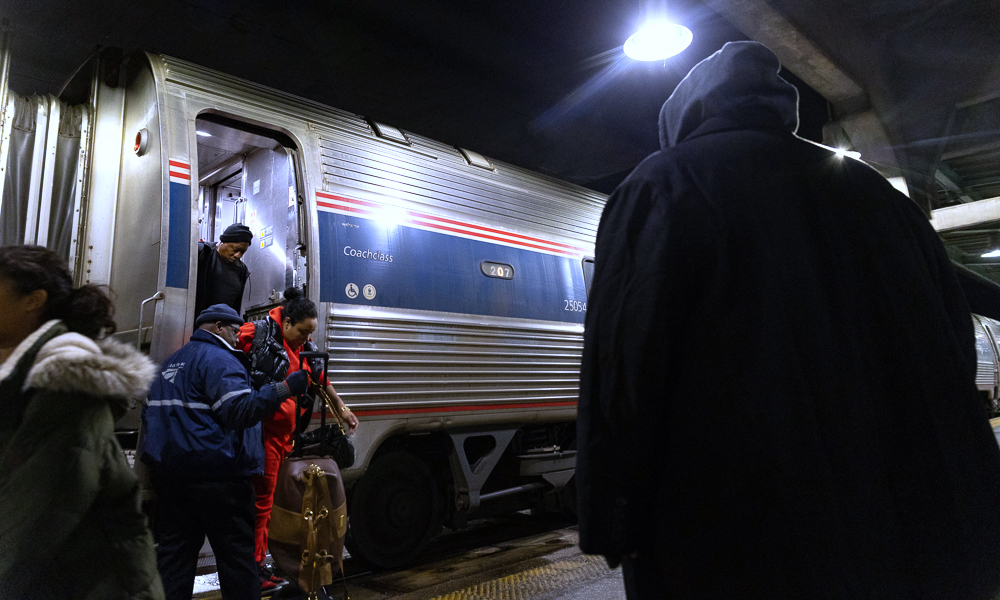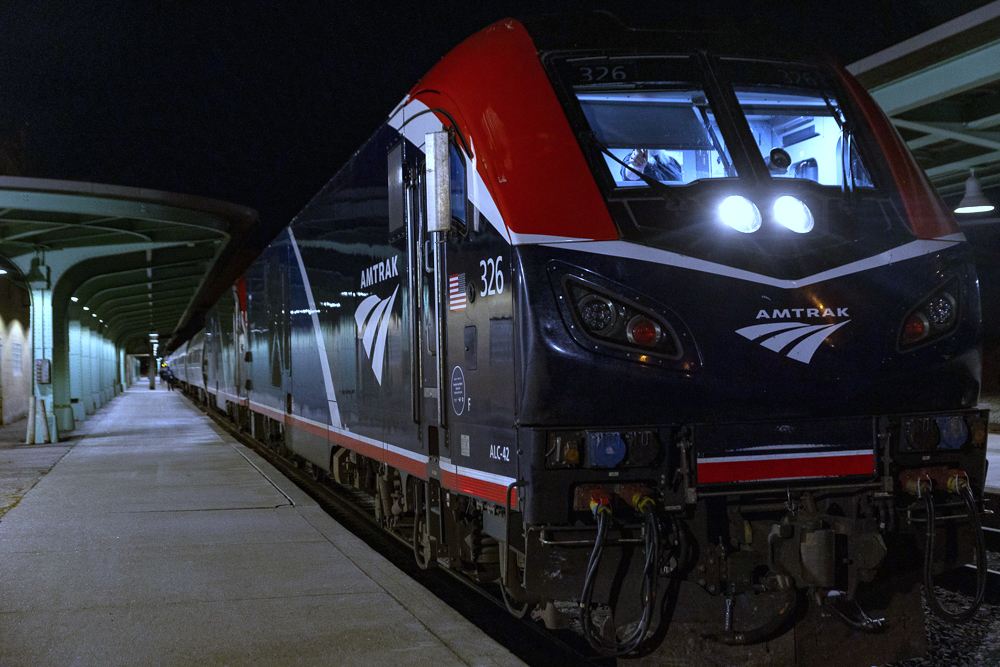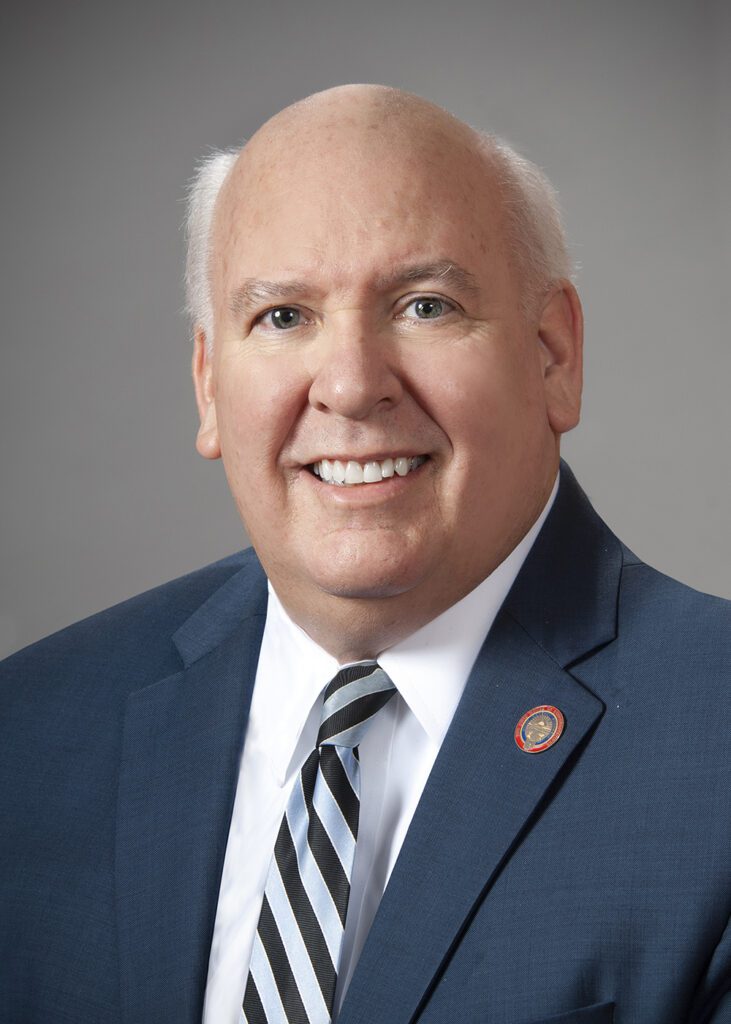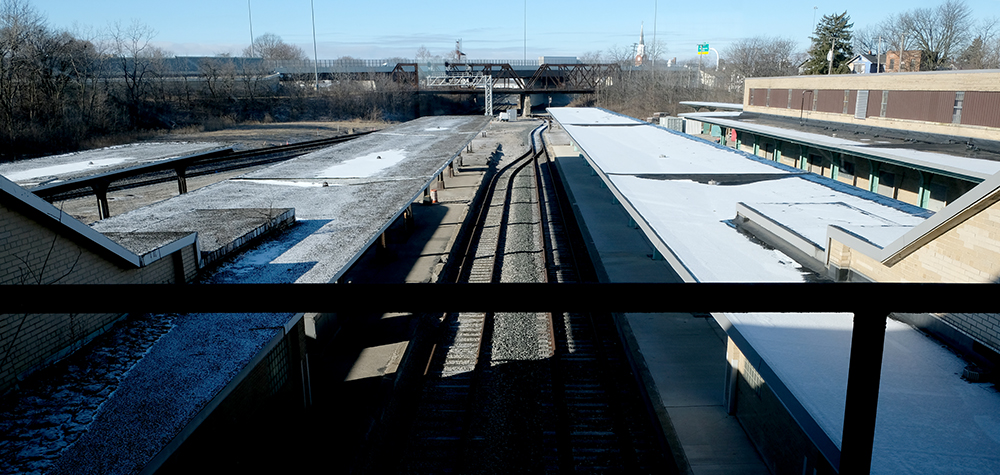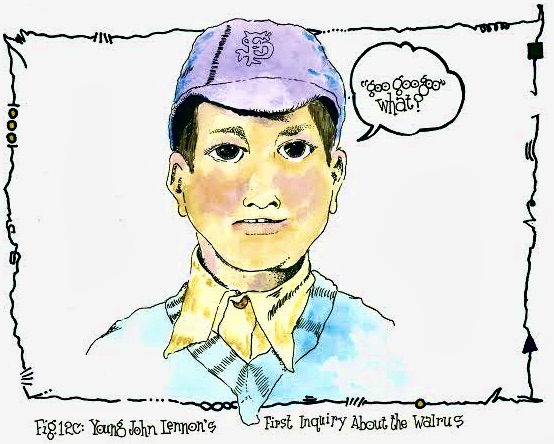Aspire Program offers GED classes
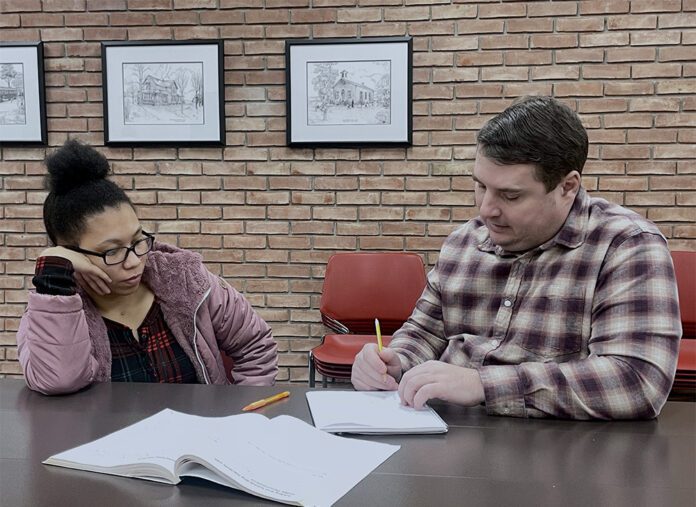
TOLEDO – While we all have different paths in life, one constant is the changeable nature of that journey and that plans can be altered in an instant.
Penta Career Center recognizes this fact, so through its Aspire Program, a grant-funded initiative, adult learners are offered the opportunity to pursue their GED, a free program available at 16 locations in Lucas and Wood counties.
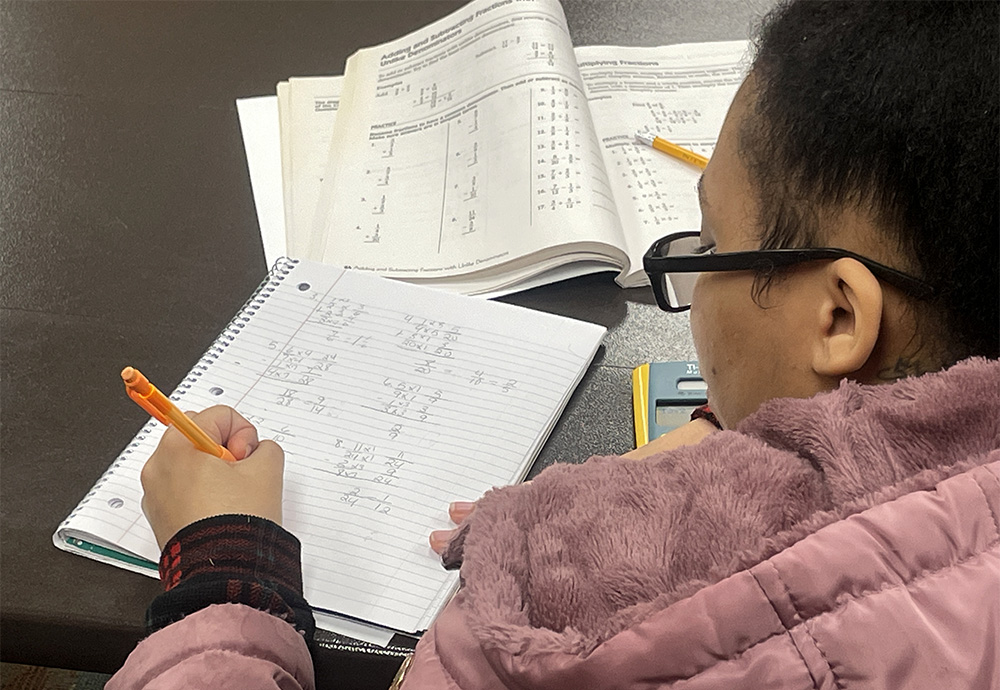
Genesis Hersha is an Aspire graduate and an example of someone who took advantage of the opportunity to take her high school equivalency test.
“I was 17, turning 18. I couldn’t pass my Ohio Graduation Tests (OGT’s) for the life of me. I did the prep test, the classes — all that stuff — and for some reason every time I would just retake them,” she recalled.
“I just tanked them. And in the state of Ohio, the only way you can graduate — no matter how many credits you have — you have to pass those Ohio state tests. So, when I turned 18, I got very discouraged and dropped out,” Hersha said.
But then a life-altering event ultimately led her to the Aspire Program.
In 2022 I was in a major motorcycle accident. When I woke up, half of my body was broken, so I was in a wheelchair.
Genesis Hersha, Aspire Program graduate
“I was 22-23 years old, and I was a single mother who went from a fully capable human being to not being able to do very much on my own. I couldn’t work,” Hersha said. “I already felt guilty for putting myself in the position that I did with my motorcycle accident. I couldn’t just sit in a wheelchair, so I decided to get myself into school.”
Aspire supervisor Jessica Arbuckle explained that the program is there for adults like Hersha, who was ready to get back into school to earn her GED. “A central focus of our program is students who are going back to earn their high school equivalency.”
“However, we service students who do have their high school diploma but maybe need to come back to move on to post-secondary. So, they could be low in their math skills and want to get into a trades program or continue on to college.”
The super power for Aspire are the course instructors who help in nurturing personal development for their students through any way possible. Jo-Anne Chrysochoos is one such instructor.
Chrysochoos was teaching a GED class at the Reynolds Corner Library in Toledo on Jan. 15 when Hersha stopped by the classroom to the share her success story with the Free Press.
Their special relationship was on full display as Hersha entered the classroom and hugged Chrysochoos, who had been mentoring her for several years.
Hersha said she joined Aspire partially due to Chrysochoos being an Aspire instructor.
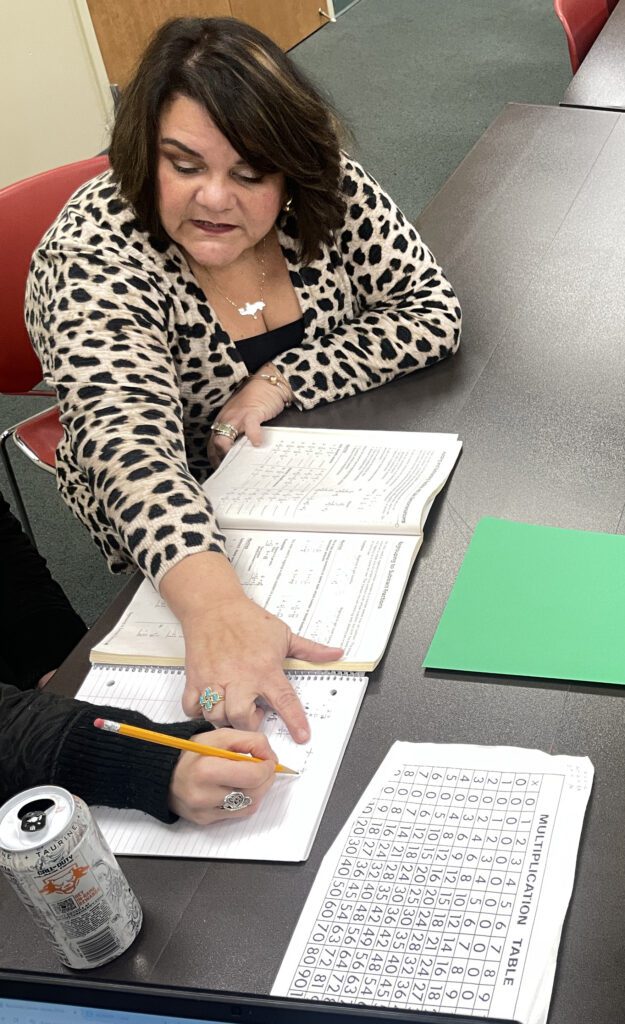
“It’s been great. Students are very appreciative and they’re adult learners,” Chrysochoos explained. “Even the young ones that come in, we treat them as adults, and they have to be independent and do what they need to do.”
“I’ve always been let down by all of my elders,” said Hersha. “I have maybe three teachers in my mind right now that actually tried to help me, in seeing that I wasn’t just a bad kid, and that’s why I thank Jo [Chrysochoos] because Jo has gone above and beyond. If it wasn’t for Jo, I probably would have never even stayed in this program.”
Registration for the program is free and can be done through Penta’s website. There is a mandatory orientation, which is the only requirement to begin the program.
Aspire even has its own graduation program, allowing friends and family to celebrate how the students have change their lives, and to show off their achievements.
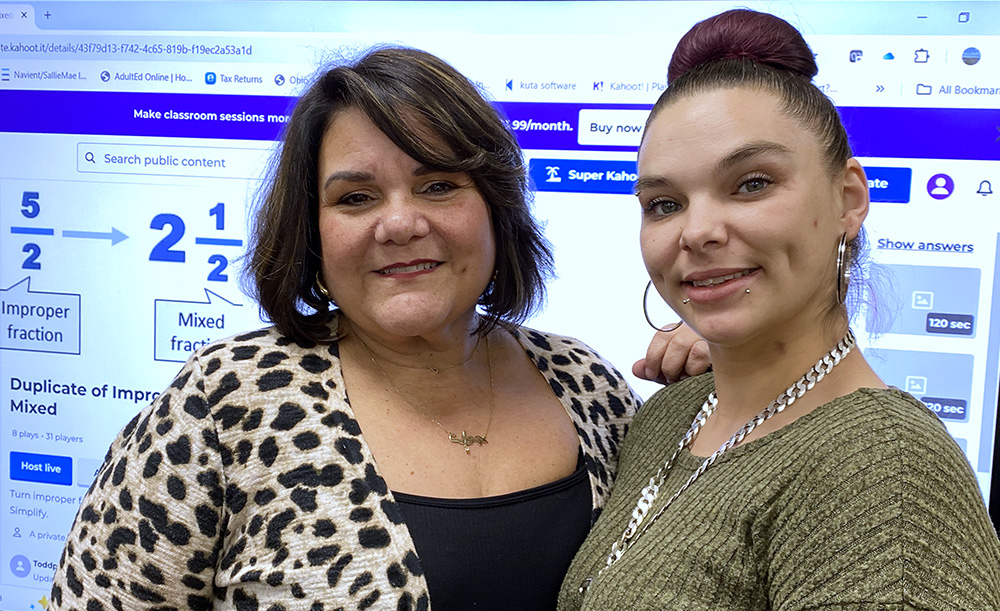
“I had a student at Sylvania Family Center who graduated a few years ago, and regrettably did not attend her graduation ceremony,” Chrysochoos recounted.
“Her husband came to my class the next year at the Reynolds library to attain his GED! After successfully passing all of his tests, he convinced his wife to attend his graduation ceremony with him to show their children that with hard work anything is possible!” she said.
Penta Career Center's Aspire program offers both on-site and online options. Classes are held two days a week for three hours each day, and the virtual option is held in Google Classroom.
For more information, contact the Aspire office at 419.491.8433
The dangerous nomination of Kash Patel as FBI director
Letter to the Editor by Kathleen Baldoni – Perrysburg resident
I can’t stay quiet about Kash Patel’s nomination. Donald Trump has nominated individuals to his cabinet whose only qualification is unwavering loyalty to him. One is reminded of Hitler, who required his administration to swear an oath of loyalty to him, with the German constitution being changed within two months.
Trump’s most dangerous choice is Patel, who has no experience in law enforcement or administration and has vowed to “weaponize” the FBI to avenge the notion that Trump has been unfairly targeted. This isn’t just a political game—it’s a threat to government accountability. That’s why we must urge our senators to say ‘no’ to this dangerous nomination before it’s too late.
Patel’s drive is to rid all who criticize Trump. As FBI director, Patel could hold immense authority to weaponize the FBI, targeting those Trump or Patel perceive as political enemies—especially those who fight for civil and equal rights. This isn’t just theoretical; Patel has openly stated he’d use federal law enforcement to go after media figures and political adversaries. This could lead to investigations of minority groups in local communities whom he deems dangerous only because they would oppose Trump’s agenda.
Patel’s nomination recalls the troubling history of leaders who leveraged their authority to serve personal or partisan agendas. One such figure is J. Edgar Hoover, the long-serving FBI director who weaponized the Bureau against perceived enemies, including civil rights leaders, journalists and activists, under the guise of national security. Hoover’s unchecked power stifled dissent and undermined public trust in law enforcement, with his actions later condemned as abuses of power.
Kash Patel’s intent to “weaponize” the FBI for Trump’s personal vendettas mirrors Hoover’s misuse of authority, threatening to erode the democratic principles of accountability and impartiality. History has shown the danger of granting such power to individuals driven by loyalty to a single leader, rather than allegiance to the Constitution.
These unnecessary investigations could also divert the FBI’s focus from real issues in our communities—like immigration reform, tax reform, economic development, combating human trafficking and addressing the opioid crisis—in favor of advancing Trump’s personal vendettas. Thus, we cannot allow someone as extreme and unqualified as Patel to lead one of the most critical institutions in our democracy.
When leaders like him are given power, they don’t just affect policies—they affect real lives, like mine and my neighbors. As FBI director, he could have the unchecked power to direct resources away from keeping us safe and toward advancing a partisan agenda.
Senator Bernie Moreno and Jon Husted, please do not vote to confirm Kash Patel as FBI director. As a resident of Perrysburg, Ohio, I am concerned about how Patel’s leadership could undermine trust in law enforcement and put my community (all communities who disagree with Trump) at risk of being overlooked in favor of political vendettas.
We cannot normalize extremists like Patel. We can not legitimize cabinet picks who are afraid to challenge Trump. The attack on the Capitol on January 6, 2021 and the subsequent pardoning of over 1,500 participants in that insurrection prove Donald Trump’s vindictiveness, and Kash Patel would undoubtedly become another tool for his revenge.
Patel lacks the judgment and temperament to lead an agency as critical as the FBI, with its 35,000 employees and vast domestic and international responsibilities. For the sake of our democracy, we cannot afford to entrust such power to someone so unfit for the role.
Flavor in the 419: Road trip to Tank’s Meats
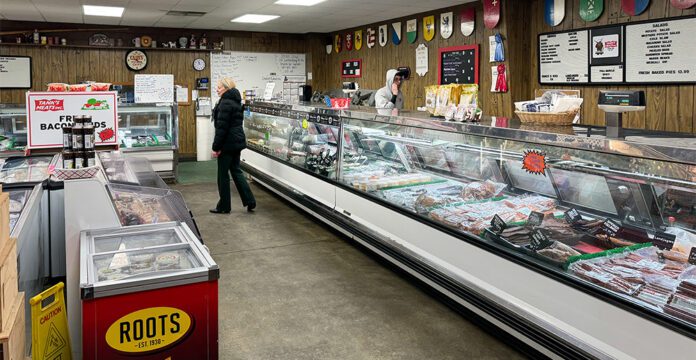
ELMORE – I first stumbled upon Tank’s Meats in a freezer case at a roadside gas station convenience store called Ozzie’s General Market, located on the outskirts of Sylvania, where Central Ave. becomes State Route 120.
Who knew this frosted curiosity would lead me to northwest Ohio’s finest purveyor of all things butchered? Dare I say, Meat Mecca?
Founded in 1907 by F.J. Tank, Tank’s Meats in Elmore has been family owned and operated for 118 years. Fred Tank started out harvesting and processing local beef, pork, poultry, turkeys and geese while selling retail from a downtown storefront. He made fresh deliveries via horse-drawn wagon and sleds.
Fred was joined by his son, Walter and Elfreda Tank in 1937. Through subsequent generations of family ownership, the business has been aggregated under one roof, just off the Ohio turnpike at Exit 81.
Kurt and Eric’s father, Alois Amstutz, immigrated to the United States in 1964 after answering an ad in a Swiss newspaper for a sausage-making apprenticeship. He married into the Tank family in 1976, with nuptials to Marcia Amstutz, the daughter of Walter and Elfreda Tank. Al’s expertise in specialty Swiss and German products expanded the range of offerings.
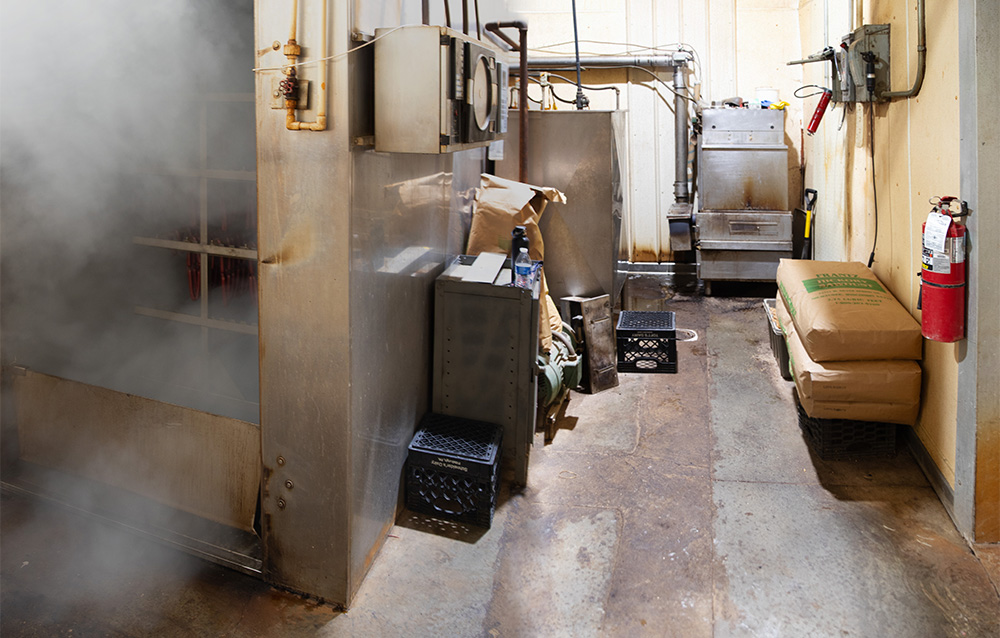
Tank’s Meats is currently led by 4th-generation brothers Kurt and Eric Amstutz, who manage operations, processing and distribution of high-quality meats to independent grocers, restaurants and food banks within a 180-mile radius of their Elmore headquarters. The brothers grew up at Tank’s Meats, working alongside their father who taught them the craft of butchering and preparing cuts for market.
From the early age of 14, Eric and Kurt worked after school and on weekends, instilling a strong work ethic and familiarity within the industry. They would make deliveries via moped and participated in raising sheep, goats and chickens on their five-acre property.
Eric oversees sausage making and smoked meats, coming up with new recipes and managing relationships with suppliers, while Kurt manages USDA compliance and permitting, sales and distribution. Continuing the family’s multi-generational tradition in the meat processing business provides a sense of pride, and working day-to-day with family yields its own rewards.
Kurt and Eric have developed a strong working partnership by focusing on shared goals, learning to communicate and compromise, and putting in the effort to understand each other over many years of working side-by-side. This flexibility and commitment to the business, and to each other, is a big part of their success.
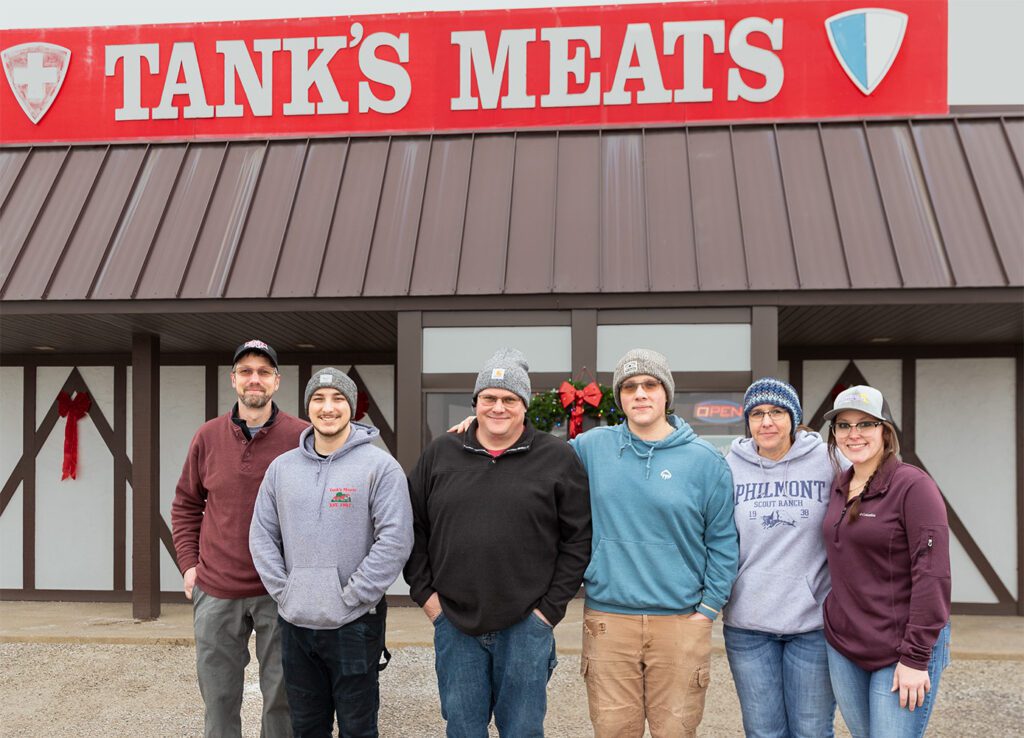
The business has gone through many changes as consumer tastes and preferences have shifted, along with changes in regulation and compliance standards. The growth of commercial farming and ranching practices have outpaced smaller family-run independent farms, and led to producer aggregation and specialization.
Tank’s no longer slaughters live animals, preferring the consistency and availability offered by specialty partners. Consumer’s bulk purchase of beef and pork are less frequent due to a variety of factors, like decreased average family size, lower homeownership percentages, and less time for food preparation. Deep freezers and home-cooking are being replaced by more accessible fast-casual options and food delivery apps. Food technologists and vegetarian alternatives continue to innovate plant based alternatives too.
Sourcing high-quality, consistent ingredients from trusted suppliers is critical to maintaining their reputation and growing market share. They’ve stayed relevant by investing in technology and automated equipment for tasks, like portion cutting and patty forming, mixing and sausage stuffing, and smoking meats while relying on a core group of experienced butchers.
Tanks’ works with restaurateurs to devise custom cuts that satisfy their needs for size and presentation. Tank’s can also create custom bacon and sausage formulations.
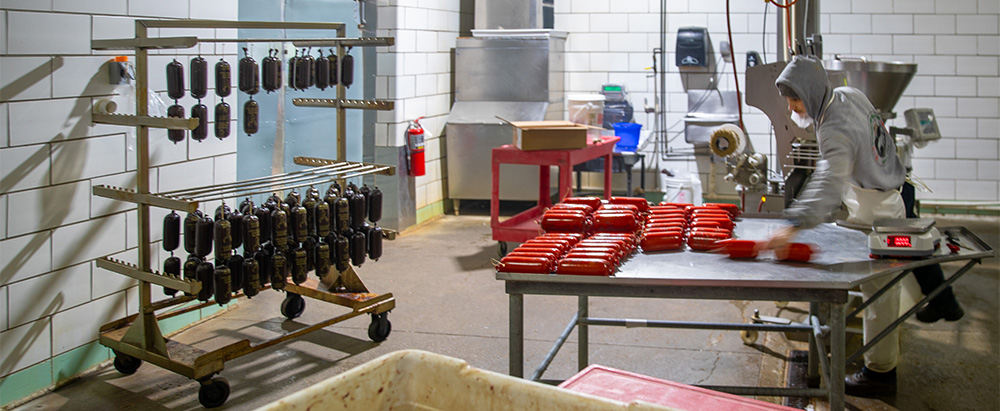
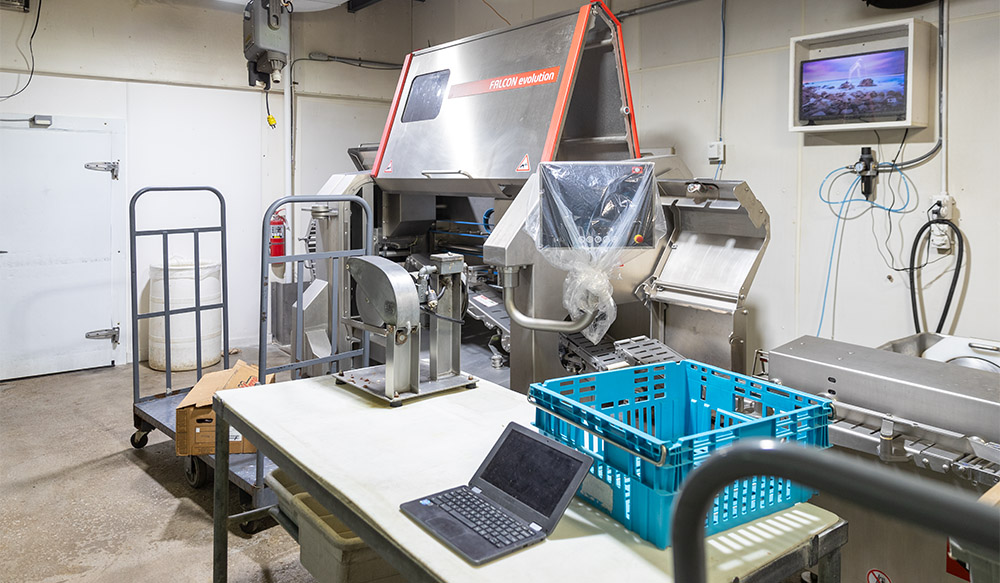
In addition to producing their own products, Tank’s works with local suppliers to bring a broad selection to their retail clients. From Amish pastrami to all-natural pet treats, soup bones to stock, Tank’s has it all.
They make cured meats, deli meat (garlic bologna, yum!) and smoked meats, like landjaggers and dried sausages. They process venison for hunters and can mix ground beef and pork to exact specifications. One of their specialties is crafting jalapeño cheddar summer sausage chubs! Weekly specials are available on their Facebook page.
With over a century of business development and improvement, Tank’s Meats is a resource for culinary connoisseurs in northwest Ohio. Kurt and Eric’s kids are currently on-site learning the business and working to extend their family’s legacy.
In addition to their Elmore retail store, Tank's Meats is available at Churchills (Maumee & Perrysburg), Zavotski, Kilgus and Ozzies General Market.
Tank's Meats is open Mon-Fri from 8 a.m. - 5 p.m., and Saturday from 8 a.m. - noon.
Leadfoot Granny band gives hope to Toledo music scene
Story and photos by Kyle Brown
TOLEDO – Speak to anyone who has lived in Toledo about the music scene, and most will say it wilted away drastically in the early 2000s. Bands that once traveled the country making stops in this city now detour around it and move into cities like Detroit, Cleveland, Columbus and Pittsburgh. Sure, the Huntington Center brings in big acts from time to time, but it is a shadow of what it used to be.
Leadfoot Granny, one of Toledo’s youngest and hottest rock bands, is on a mission to change that.
The band, whose members include Hope Smith (vocals), Luke Ermie (lead guitar/vocals), Owen Krupp (bass guitar/vocals) and Odin Woodbury (drums), are all from different musical backgrounds. Hand-picked from Toledo legend Mark Mikel, Leadfoot Granny seamlessly brings the feeling of rock ‘n’ roll back from the dead.
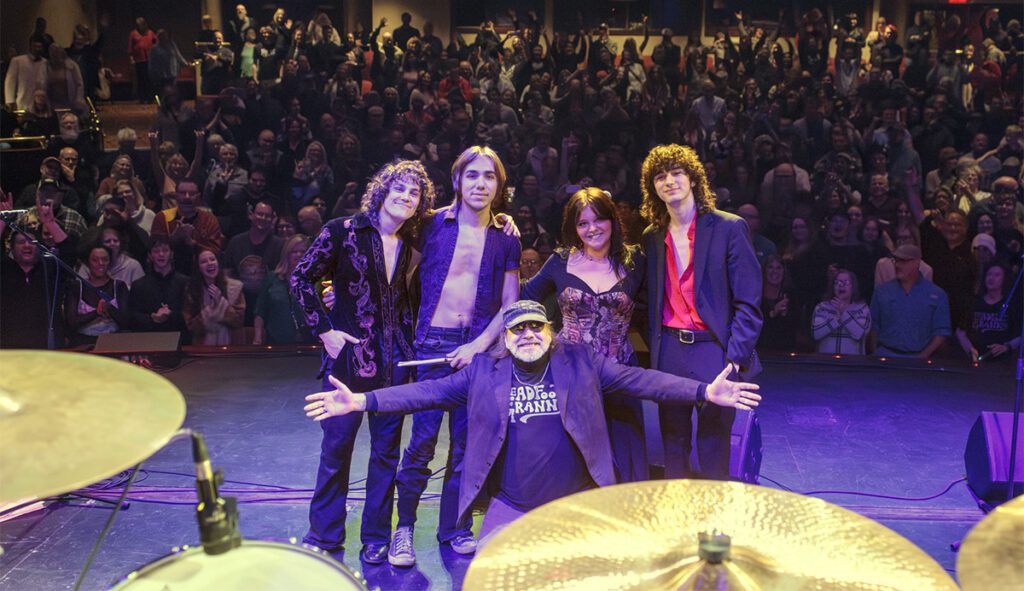
Formed only a year ago, the band has made sizable shockwaves around the community. They were featured in a local newspaper after their first show. From there, they caught the attention of many during a music festival in Fostoria, Ohio, while also blowing everyone’s minds during Toledo’s Pride Fest.
The band earned a spot as Toledo’s most-likely-to-succeed category, and were on the final ballot for Best of Toledo 2024. These are only a small selection of accomplishments, not including TV interviews, radio show appearances and gigs outside of Ohio.
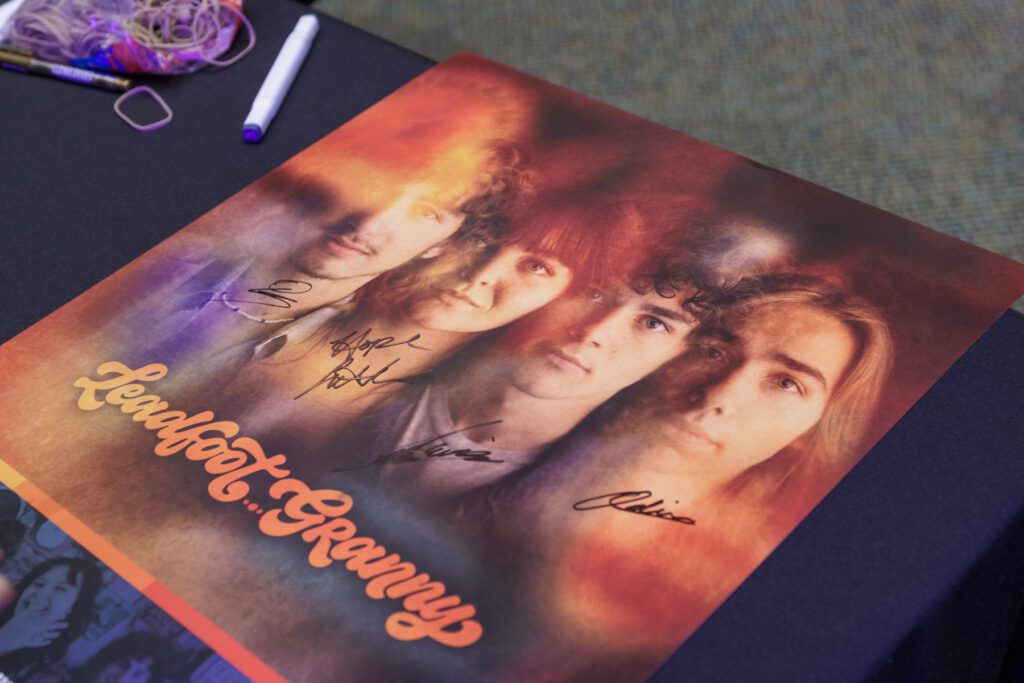
The biggest accomplishment came this past Saturday though, as Leadfoot Granny celebrated their first self-titled album on Jan. 19. To celebrate, Leadfoot Granny hosted their album release party and show at Toledo’s Valentine Theatre.
When the doors opened at 6 p.m. for their VIP ticket members, fans were treated to a mini meet-and-greet an 90 minutes before the show. They were able to grab a few drinks and popcorn, and sit at tables to mingle with other fans after lining up to get signatures on merch or a poster made for the event. The 45-minute meet-and-greet allowed fans to interact with all four members of the band, who sat near a huge neon sign featuring their logo.
At 7:30 p.m., the crowd, who nearly packed The Valentine, began chanting “LFG, LFG, LFG,” which is the abbreviated band name. Then the curtain lifted and the band that many call “the future of Toledo’s music scene” went on to give the crowd exactly what was expected of them.
This band doesn’t sound like any other band out there. They take their influences from many genres, and mix it all into one masterpiece after another. Eight songs on their album are originals. Two are covers, including a rock take on Britney Spears’ Toxic.
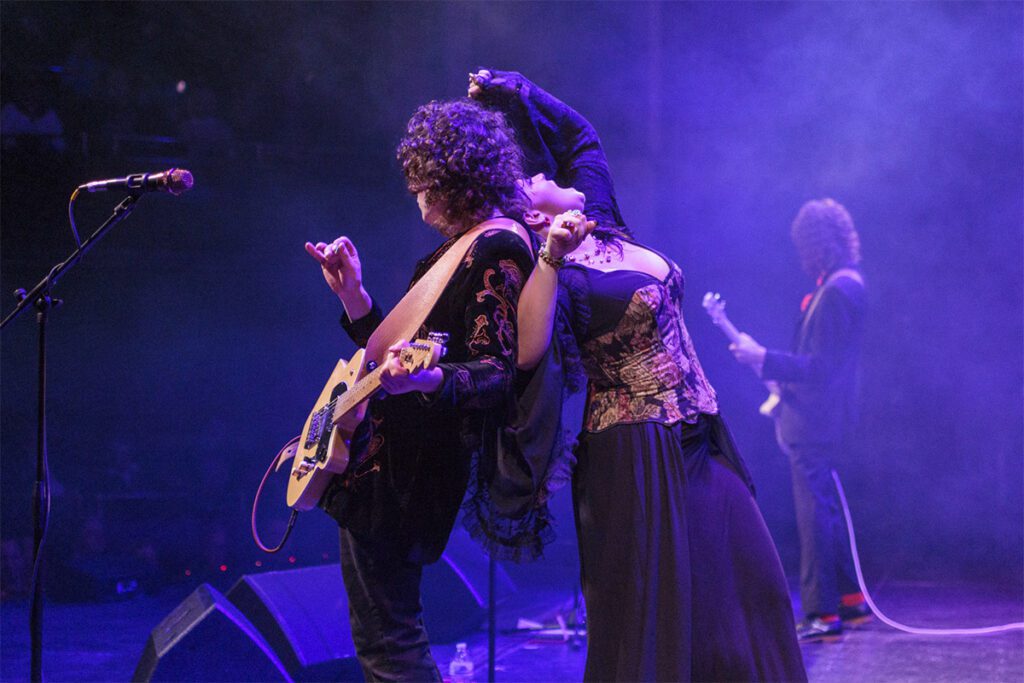

They also take the job seriously, and dress the part. Think suits with a jacket under it, nice dress shirts, dresses that flow and colors that pop. The band won’t be in a t-shirt and jeans come show time, and it has become part of the band’s identity. It is easy to see that they want to be taken seriously, and dressing for success is important to them.
After a powerful opening few songs, Leadfoot Granny took it down a few notches and came closer to the front of the stage for an acoustic set. This set was able to showcase the softer side of their music abilities, and show they don’t just play one instrument.
Smith was able to show her harmonica skills with Woodbury on guitar and bongos, and Krupp played the mandolin (and keyboard at the end of the concert).
The last part of the show didn’t let up on the energy, as strategically placed smoke added to the elements for the band; they conquered any pre-show jitters and gave attendees an unforgettable show.
Leadfoot Granny, the band’s self-titled album, was produced by Mikel, who described it as “the best album Toledo has ever made.”

Terry Brown, known for producing albums for bands like Rush and Klatuu, mixed this album. On a Facebook post, he stated when speaking of Leadfoot Granny, “Odin Woodbury owns the drums; Luke Ermie’s accomplished guitar chops cover a wide spectrum; and Owen Krupp locks onto what Odin with his wicked bass sound.
“In the meantime, Hope Smith is on fire, delivering emotional performances that will get your heart pounding! Leadfoot Granny is on the countdown!” he exclaimed
Rob Fraboni, who has worked with bands and artists like Bob Dylan, The Rolling Stones, Eric Clapton and The Beach Boys, mastered the album. On Facebook, he would write, “I was asked by a dear friend, Terry Brown, to master Leadfoot Granny’s debut album. I was really taken by the music, firstly. The songs, musicianship, all of it. Hope Smith is the real thing. I feel they have a bright future, if they have what it takes to follow it down the road! A brilliant start!”
When all is said and done, this Toledo-based band has produced an album that notable people in the industry find to be brilliant. Leadfoot Granny has found a way to bring Toledo out of the darkness and bring great music back into it. Their album is listed on all streaming platforms.

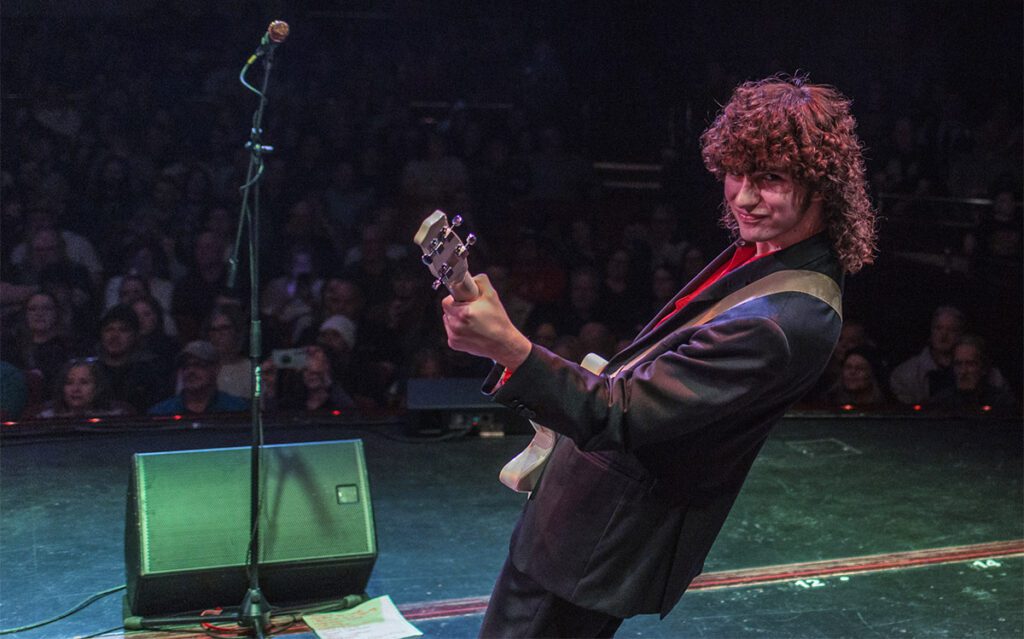

S.A.V.E. saves environment through education, action
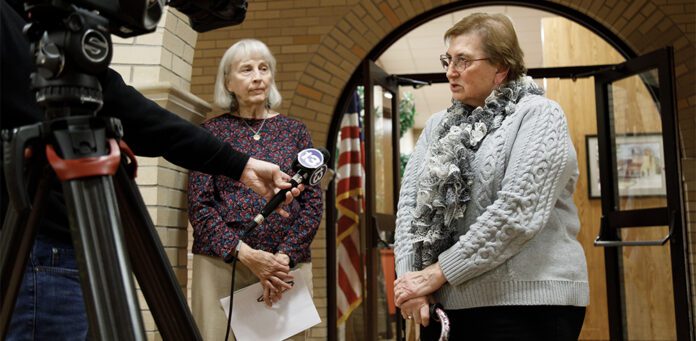
SYLVANIA – The number of groups that promote protecting the environment are legion, from ones on the international stage, like the United Nations Environment Programme, to ones more commonly known, like Greenpeace.
But there’s a longtime group based at Lourdes University in Sylvania that’s been going about its mission in relative anonymity: S.A.V.E. – Science Alliance for Valuing the Environment.
S.A.V.E. was founded on Aug. 10, 1990 by three women who “felt we needed to do something about saving our Earth,” said Sr. Rosine Sobczak, the remaining one of the three women and the S.A.V.E. coordinator.
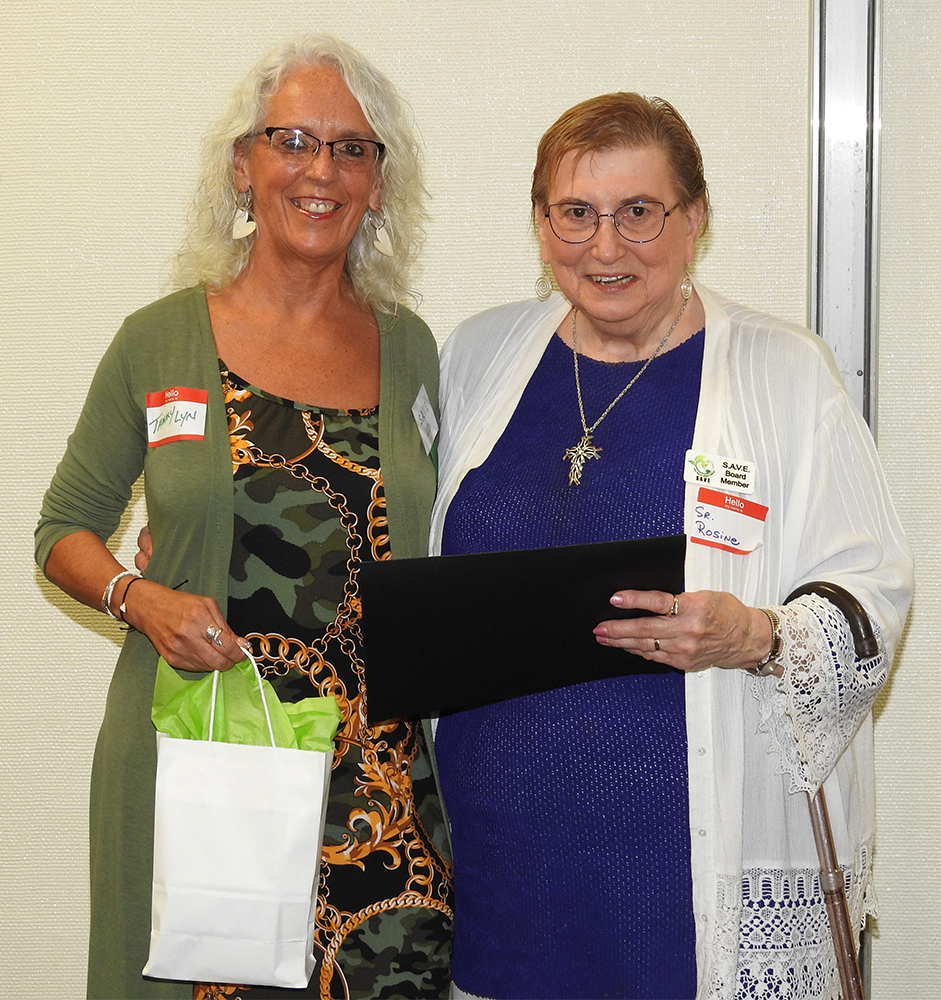
Sobczak, associate professor emerita at Lourdes University, which follows Catholic and Franciscan principles and is sponsored by the Sisters of St. Francis. Sobczak, added, “I really felt in my heart I was being called to this ministry.”
She looks at S.A.V.E. as a ministry because of what sets it apart from any other environmental action group in northwest Ohio. The group focuses on three points: ecology, sustainability and — the difference-maker — spirituality.
One of the activities of S.A.V.E. is presenting a bi-monthly series of lectures free to the public. The lectures generally are held in the board room in the Franciscan Center on campus and streamed on Zoom. Details and the Zoom link can be found on their website; and all lectures are from 7:30-9 p.m.
“I have been trying to put in at least one lecture that has a spiritual dimension,” Sobczak said. This will be the approach with Spirituality of the Cosmos: What Stars Teach Us About Hope, to be held on March 11.
The next one will be Laugh Learn, Life Fully: Embracing Environmental Stewardship with Humor, Knowledge, and Action, on April 8.
Other lectures dealt with ocean conservancy and coastal cleanup, microplastics and wildlife filmmaking.
Sobczak said that adding the Zoom component to the lectures has increased their audience. Longtime board of directors member John Krochmalny agrees. He provides technical expertise to livestream the lectures and post them on YouTube.
“The amount of hits on those programs are large,” he said. “They have an international audience.”
S.A.V.E. reaches out to the community through other activities. It collects and recycles used cell phones, laser and ink-jet cartridges, laptops, MP3s, tablets, readers and notebooks.
It also produces a quarterly newsletter; takes part in local conferences; conducts an annual awards program where it presents environmental awards; provides two scholarships for graduating high school seniors; and collaborates with Lourdes’ Lifelong Learning program to spread its message.
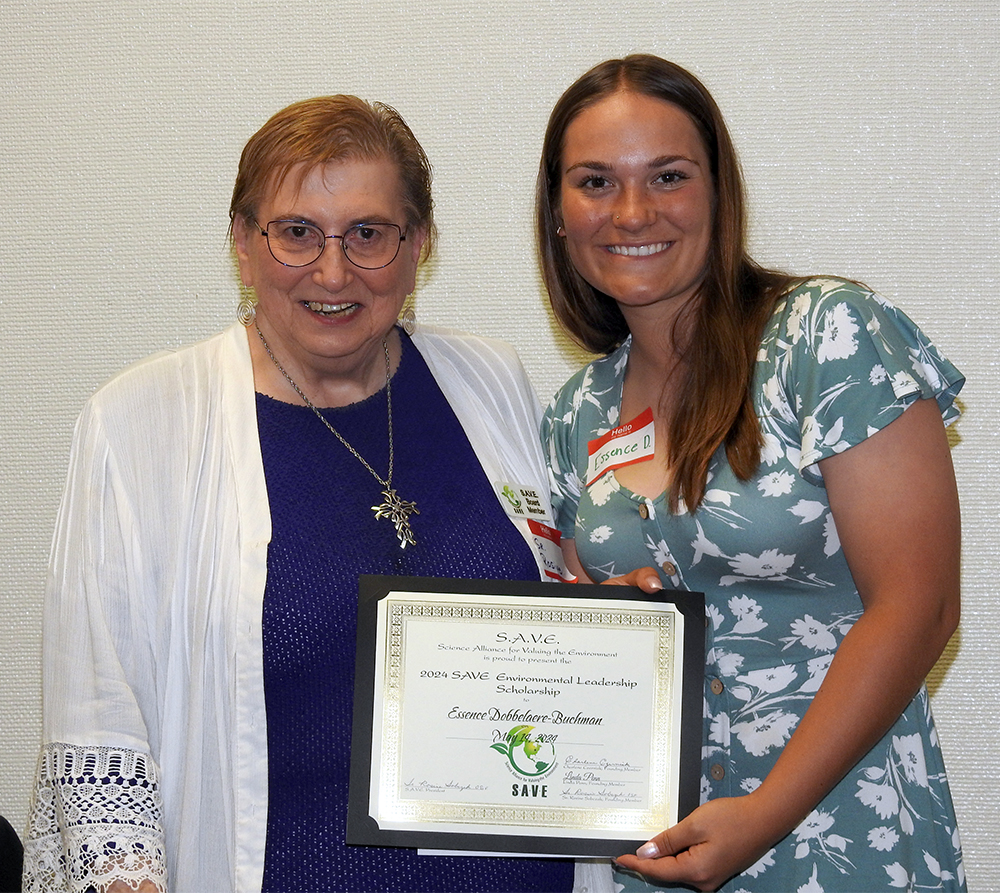
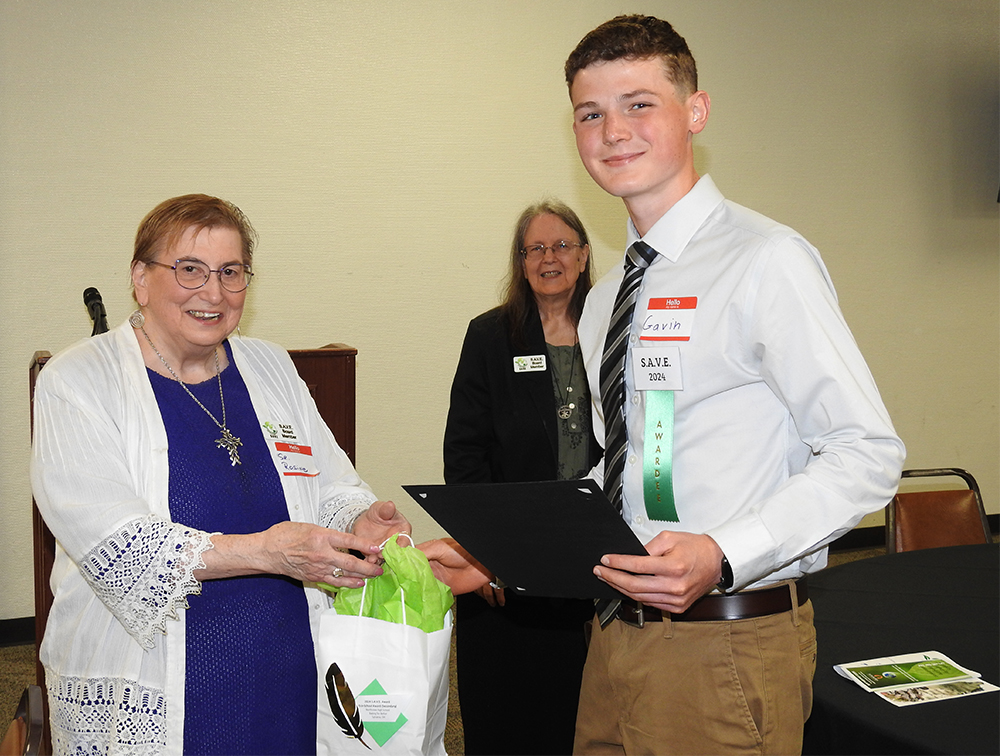
Its message: Save the environment through education and action. As its website says, “S.A.V.E.’s activities are designed to empower individuals to values-based action for a just and sustainable world.”
“People are hungry to reconnect to the natural world,” said Cynthia Nowak, a new addition to the nine-member board of volunteers.
“S.A.V.E. offers not a shaming or fear-mongering approach; it’s an approach of hope. A message of optimism — we have the ability (if we have the will) that we can turn things around,” she said.
“Transformative times require hope,” Sobczak added. “S.A.V.E. offers hope in educating others for a sustainable future.”
Lutheran churches unite to remember MLK’s legacy
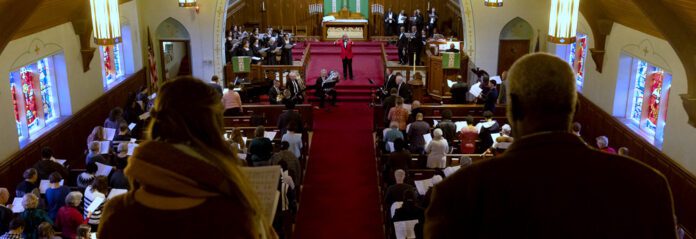
Story and photos by Stephen Zenner
TOLEDO – Five churches gathered at Glenwood Lutheran Church on Sunday to participate in a celebration of Martin Luther King Jr., a reflection on the legacy the civil rights leader left after his assassination on April 4, 1968.
A litany of selected music, poems and spiritual songs was combined with a general call to action from keynote speaker Alicia Smith, executive director of the Junction Coalition, who – while not a pastor – roused the spirit of the congregation.
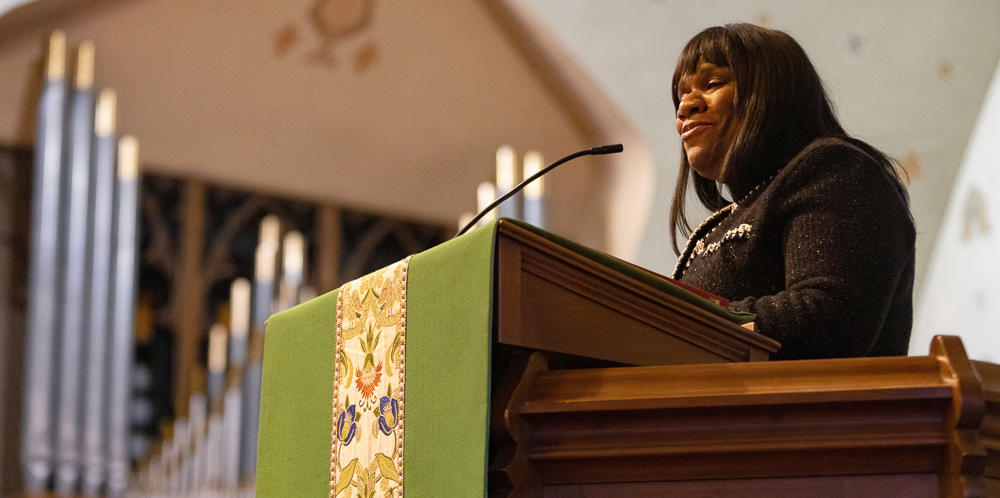
Quoting Philippians 4:6-7 from the pulpit, Smith preached an atmospheric change for the people.
“Do not be anxious about anything, but in every situation, by prayer and petition, with thanksgiving, present your requests to God. And the peace of God, which transcends all understanding, will guard your hearts and your minds in Christ Jesus,” she said with the congregation quoting the famous passage along with her.
The overall message for the church was to not give up, but also to take concrete action in their communities.
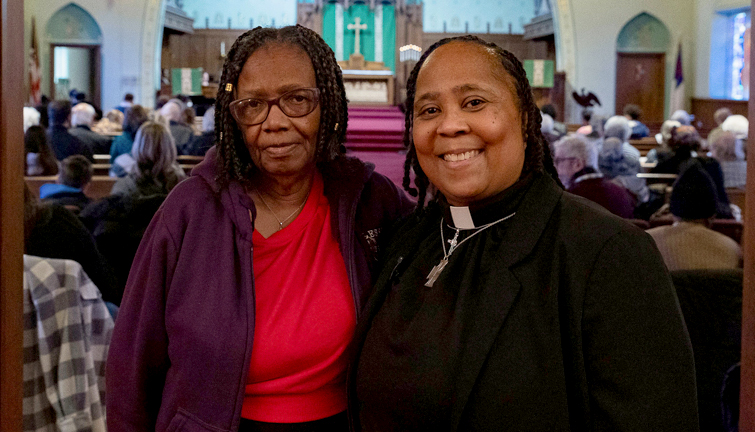
“The dream is okay,” said Ruth Whittle, a member of Glenwood Lutheran, who, at age 75, is old enough to personally remember King’s life. “I remember that he had a dream, and we are still dreaming. But we think we should move away from the dream and start doing things that make sense.
“Someday you have to wake up,” she said. “We are insisting that things get better in this world and stop dreaming about it. So, we have to get out in the world to work hard to do that.”
The Change Wall mural on the back of the church depicted King surrounded by colorful action words as attendees were ushered into the service titled Have Courage: Be the Change.
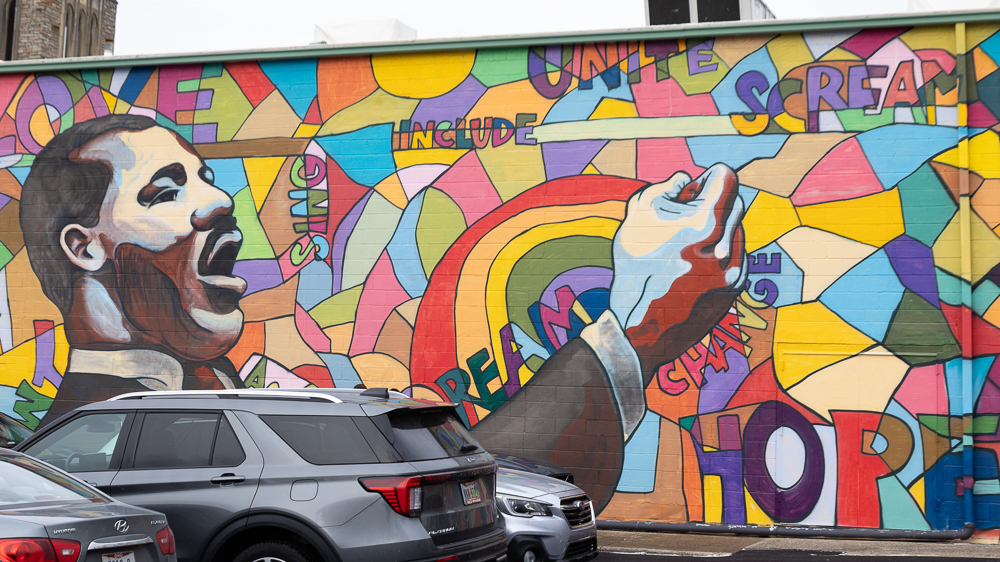
Musical offerings were the highlight of the service and took up most of the time during this celebration of King’s life and mission.
“Music has always been part of African culture,” noted Clarence Smith, founder of the Clarence Smith Community Chorus, which performed along with a number of other musicians. “So we just carried that tradition as part of the culture.”
“It’s unifying,” he said about the experience of singing together in the church.
“And you could kind of sense that all of a sudden we’re one as we’re singing,” Smith added, pointing out the importance of the songs sung “…in churches, on the streets and the in jails” to the civil rights movement.”
After Alicia Smith’s sermon, attendees greeted one another, a collection was taken up for the Martin Luther King Jr. Kitchen for the Poor (a nonprofit kitchen in the Junction neighborhood) and then they sang the gospel song We Shall Overcome.
We are no longer waiting for the change … bring the change.
Alicia Smith
In the 2010s, the Junction Coalition started meeting the needs of the Junction neighborhood. “Now the Junction Coalition has started to work into other communities,” she added.
Local, community action with love was the main message for the day.
“It takes courage to stand up and say what is right and what is wrong and to work towards a better city, a better community, a better state, a better world, where all of us as Americans love and care for one another,” said Rebecca West-Estell, associate pastor of Memorial Lutheran Church.
This was the third consecutive year in recent times a collective of Lutheran churches put on the MLK Jr. service in Toledo. Previously, Lutheran churches in Toledo organized an MLK Jr. service but experienced a prolonged “hiatus due to staffing changes,” explained Chris Hanley, pastor for Glenwood Lutheran Church.
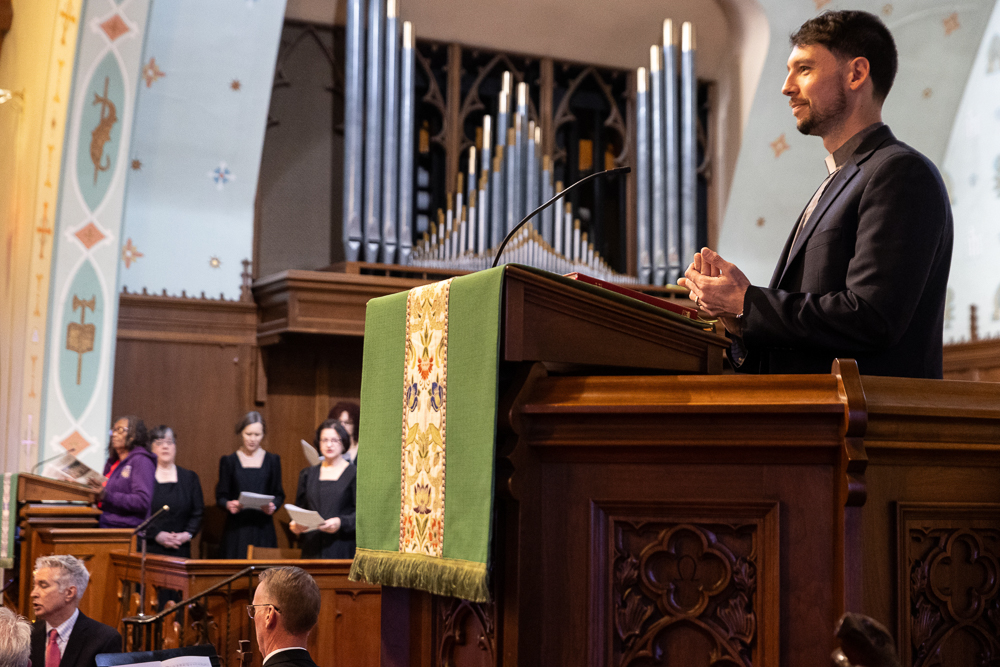
Glenwood Lutheran Church and Ascension Lutheran Church hosted the event, while Olivet Lutheran Church, Memorial Lutheran and Grace Lutheran Church collaborated for the service.
“The dream didn’t start with him [MLK Jr.]; it started with the African slaves,” said Ophelia J. Thompson, a local poet who goes by LaFe.
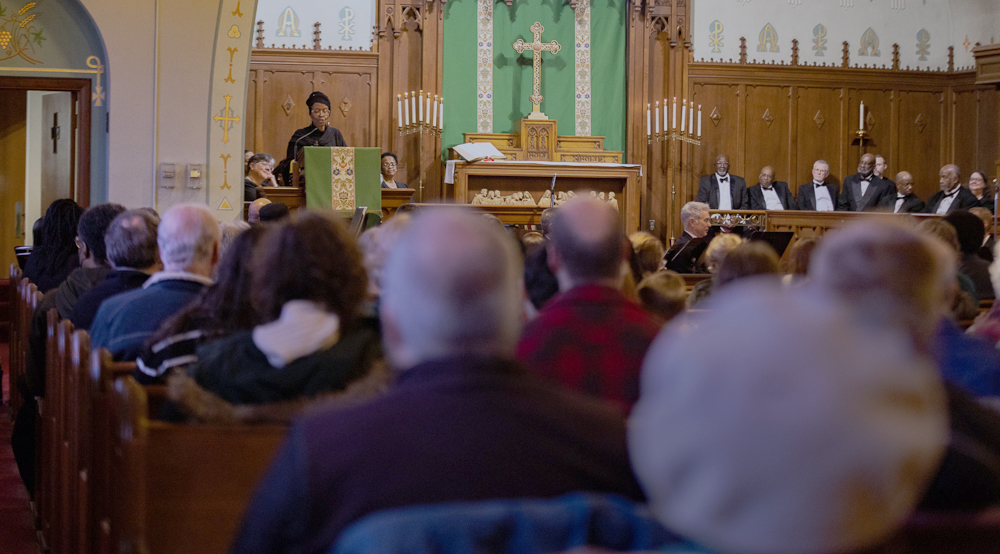
During the service, she recited Poem #2507 and explained that King was one small part in the longer tradition of freedom from slavery to Reconstruction, and from Jim Crow to the Civil Rights Era and beyond.
Excerpt from #2507
“Faith without works, truly dead; pay attention to what our ancestors said, then build on this dream that was born in the past, only then can we sing, “Free at Last.”
Commit and be that change, that causes your communities to be rearranged."
